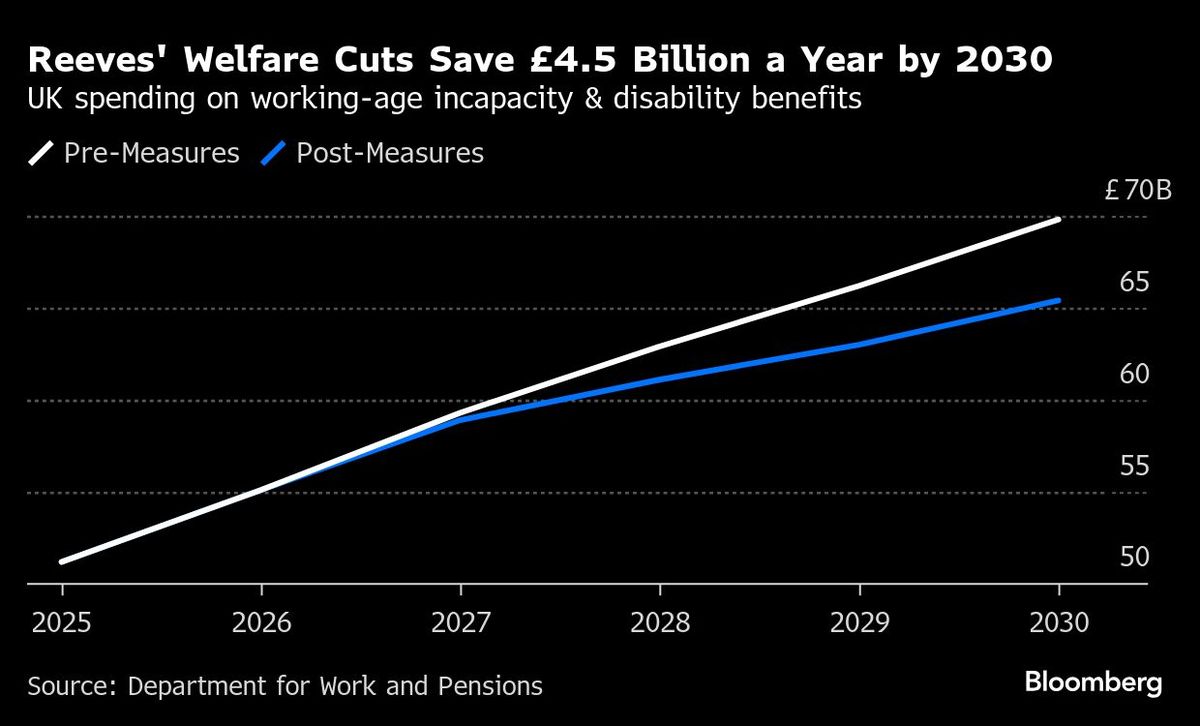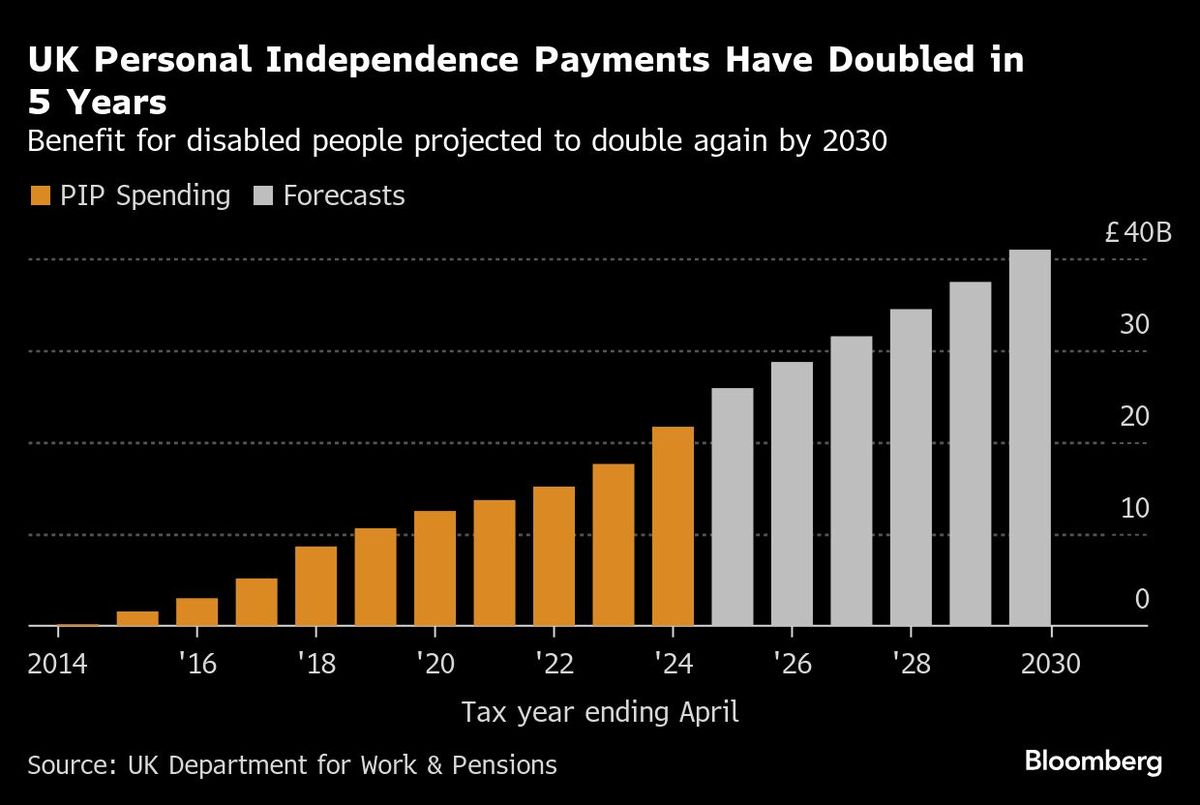
Two British think-tanks say the government should give firms a 'holiday' on certain payroll taxes when they hire employees who are on long-term sickness or disability benefits.
(April 7): The UK government needs to consider more perks for businesses and employees if it’s serious about getting the long-term sick back into the country’s workforce, two think-tanks said.
Chancellor of the Exchequer Rachel Reeves should give firms a “holiday” on certain payroll taxes when they hire employees who are on long-term sickness or disability benefits, the Good Growth Foundation (GGF) said. Meanwhile, the Institute for Fiscal Studies (IFS) suggested the government needs to go further to break the link between starting work and losing welfare benefits.
Reeves and Prime Minister Keir Starmer are on a drive to coax some of the UK’s 2.8 million people who are currently economically inactive due to ill health back in to work, in a bid to spur growth and slash welfare spending. Announcing welfare reforms last month, Reeves warned that with one in eight young people not in employment, education or training, without action “we are writing off an entire generation”.
The Labour government’s proposals involve limiting so-called Personal Independence Payments to only the most severely disabled and cutting health-related top-up payments to those on universal credit who are signed off work. That’s drawn criticism from several Labour members of Parliament for pushing 250,000 more people into poverty, according to the government’s own impact assessment.
“The welfare system we inherited is broken; it’s holding people back and it’s holding back growth,” the government said in an emailed statement. “We have a proper plan to reform the welfare system so that it supports those in greatest need, while delivering a £1 billion (RM5.72 billion) employment support package and re-balancing Universal Credit payments to tackle perverse incentives that pull people away from the workforce.”
In order to reduce the number of people who could face financial hardship as a result of the government’s plans, the left-leaning GGF suggested that businesses who hire employees on disability or sickness benefits should be given a one-year break from paying National Insurance contributions on those staff. It estimated that would actually save the Treasury £1.1 billion by cutting welfare payments while boosting income tax revenues.
The GGF’s figures assume an extra 150,000 people would move back into work, on top of the 16% of people who are inactive due to sickness who are already projected by the government to do so this year. To break even, the policy would need an extra 67,000 people to take up a job, the GGF said. It assumes 50% of the people returning to work would take jobs from existing staff, and it has briefed its ideas to No 10 Downing Street and the Treasury.
“If there are people who could work and would like to work that are currently on these benefits, if we can make it as supportive as possible to help them to get back into work into appropriate jobs that they can do, not only will that mean more pounds in their pockets, but it actually is incredibly good for the exchequer and for the wider economy as well,” said Praful Nargund, director of the GGF. “Not only are you saving on the benefits, but they’re also paying tax.”
The suggestion is likely also to be welcomed by businesses who have warned a rise in the level of employer National Insurance contributions, which came into force this month after being announced in last year’s budget, will stymie growth. “Businesses need it, voters support it and it puts money back into the public purse,” Nargund said.
Tom Waters, an associate director at the IFS, said the government’s current planned cuts to welfare are unlikely to generate substantial savings, and that “a lot more” needed to be done to move significant numbers of people into the labor market.
He suggested ensuring those who currently receive sickness or disability benefits should be able to get back into work without automatically losing the right to their payments. While Work and Pensions secretary Liz Kendall made a move towards this last month, announcing that the government would legislate for a “right to try” so disabled people would not automatically be reassessed for benefits if they find a job, he said the government could go further.
“If you are on incapacity benefits and out of work, you would very legitimately worry ‘if I get a job I’m going to lose my incapacity benefits, and then if the job doesn’t work out then I’m screwed,’” Waters said. He said the current policy was opaque, and that breaking the link entirely between work and losing disability benefits would help encourage claimants back into the labour market.
Uploaded by Felyx Teoh
- Global funds hit pause on Indonesia after Prabowo policy changes
- Trump warns tariffs coming for electronics after reprieve
- Embattled billionaire Ong Beng Seng to step down from Hotel Properties
- Jentayu signs 40-year power purchase agreement for RM2.8b 162MW Sabah hydropower project
- Singapore eases monetary policy as expected, sees weaker growth in 2025
- China's March exports jump in temporary boost as Trump 2.0 heaps pressure
- Stocks rally in Asia as electronics get a tariff break
- Miti: 30 Malaysian firms set for 150 business matching sessions at Expo 2025 Osaka
- Frankly Speaking: After special review, what’s next for YNH?
- Share buybacks in vogue again amid market uncertainty


